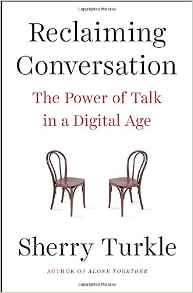 Sherry Turkle, Reclaiming Conversation; The Power of Talk in a Digital Age (New York: Penguin Press, 2015), 436pp.
Sherry Turkle, Reclaiming Conversation; The Power of Talk in a Digital Age (New York: Penguin Press, 2015), 436pp.
I have a friend who was a dean of students at Stanford University for some twenty years, and so at church one day I asked him what sort of changes he had observed over two decades. Without any hesitation at all, he responded, "students today don't know how to talk or to have a conversation."
That, in effect, is the thesis of Sherry Turkle's newest book. Turkle, a professor of technology and the social sciences at MIT (she's also a clinical psychologist), has studied our human relationship to technology for almost forty years. Her previous book, Alone Together (2011), studied "why we expect more from technology and less from each other." This volume, based upon hundreds of interviews since 2008, explores the troubling consequences of how we converse less with each other, even as we connect more with technology. It is, she says, "a call to action."
Technology isn't a neutral tool. It enchants. "It makes us forget what we know about life," and exerts a "seductive undertow" on us. To take just one example, the average adult checks their phone about every five minutes — over 200 times a day. And that figure might be too low, because many of us under-report because we think we're better than we really are.
It's not that we're bad people, says Turkle, and in some ways we shouldn't be too hard on ourselves. Rather, these are normal responses to powerful socially engineered tools: "We are exhibiting a predictable response to a perfectly executed design." Facebook, for example, has admitted that it manipulates our emotions. The best background for writing apps is a combination of software architecture, applied psychology, and behavioral economics, that is, "using what we know about human vulnerabilities in order to engineer compulsion."1
Turkle doesn't like to use the language of addiction to describe our techno-behaviors, even though "internet addiction disorder" was almost included in the 1996 DSM-IV. In her view, addiction means that you are nearly helpless before your nemesis, which is something she refuses to admit, and that you must give up the cause of your compulsions, which isn't going to happen. Getting rid of our digital devices isn't a reasonable strategy.
Whatever language we use, it's clear that our captivity to technology degrades almost all of our important human relationships, from dinner table conversations to bath time with your baby to a walk on the beach with your lover. These are just a few of our sacred human moments that are not the time to check our smart phones.
Our capacities for self-reflection and creativity are diminished. Increased productivity from multi-tasking is now known to be a myth. Studies show drastic decreases in empathy among college students the last twenty years as measured by standard psychological tests (171). Turkle devotes individual chapters to how our digital habits have impacted family, friendship, romance, education, and work.
There are no simple solutions. What we should look for are new beginnings. That requires us to acknowledge the "profound effects" of technology on us and to admit our vulnerabilities. These are the first steps toward changing our behaviors and living more intentionally with our digital devices. Then, all sorts of small steps become possible, like device-free times and places — no phones at the dinner table.
And consider these examples from Turkle — if Google's CEO Eric Schmidt admits that he no longer reads books on airplanes because he's so digitally connected, if the Harvard law professor Carol Steiker now prohibits all digital devices in her classes, and if Steve Jobs and Jonathan Ives (Apple's Chief Design Officer) limit the screen time of their children, then we can follow their own fears and reclaim a significant part of what makes us human — talking to each other.
1. Jacob Weisberg, "We're All Hooked," New York Review of Books (February 25, 2016). My italics.


